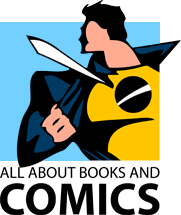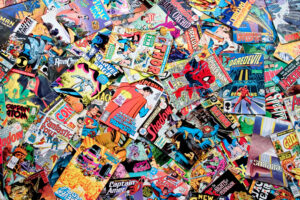Hellblazer #259 — Writer: Peter Milligan; Art: Simon Bisley
You’d think the Bisley art on this would be an event, and a natural fit, but, while there are a number of well-drawn panels, it’s just not very exciting. Part of that’s the style: it looks like it was shot directly from the pencils, and the figures don’t pop out of the backgrounds easily; Jamie Grant’s murky, monochromatic coloring makes it even worse. Part of it’s the script: for a story involving a demon from hell, it’s often talky and static, with a typical confusing/elliptical Milligan ending. It’s as if the collaboration has cancelled out the best qualities of the two creators, and drained all the potential energy from their work; readers looking for the over-the-top pizzazz of Judge Dredd and Lobo will be disappointed.
Incredible Hulk #602 — Writer: Greg Pak; Art: Ariel Olivetti; (She-Hulk story/11 pgs.): Writer: Fred van Lente; Penciler: MIchael Ryan
OK, let’s see: Bruce Banner can’t become the Hulk any more; instead, he’s hanging out with Skaar, the Hulk’s alien son who’s come to Earth to kill him. Banner’s got a personal force field for protection, and is discouraging his offspring’s patricidal urges — but he wants Skaar to be well-trained enough to defeat the Hulk if he ever emerges again, so he’s “training” him, by setting up fights with folks like the Juggernaut. Got all that? Olivetti’s art has some nice moments (there’s a good “How’d he do that?” scene in a comic book store near the end, and the action sequences are OK), but the convoluted backstory is a burden; it’s hard to imagine “civilian” readers picking up this issue — expecting, you know, a story about the Hulk — and caring enough to come back.
X-Men: The Confession #1 (of 1) — Writers: Craig Kyle and Chris Yost; Penciler: Bing Cansino; Inks: Roland Paris
Just what the title says: Scott and Emma confess their various indiscretions (Scott sending X-Factor off to kill people; Emma being in the Dark Reign inner circle), and, 22 pages later, kissing. In a comic with a cover price of $3.99. Seriously, that’s all that happens in this book. As a three-page sequence in an actual X-Men comic, this would have been fine, but an entire issue? Not by the regular creators? With boring art? For $3.99? Marvel thinks you’ll buy anything.
Wolverine: Origins #40 — Writer: Daniel Way; Penciler: Scot Eaton; Inker: Andrew Hennessy
We get to meet Romulus, and he has a “climactic battle” with Logan that this title’s been building up to since Jeph Loeb came up with the guy’s name a couple of years ago. Does it surprise you that, even though they’ve expended a year and a half on Wolverine getting the magic sword that can kill this guy, it’s not actually used (well, one stabby panel or two, but, c’mon, it doesn’t actually do anything…)? Or that the ending is left unresolved, with both characters living to fight another day? Way has certain strengths as a writer, but they tend toward cartoony violence and comedy; the Bugs Bunny-like confrontations between Wolvy and Deadpool were his high point on this title. Actual drama? Resolution of storylines? Pathos? Not so much. Eaton’s art, meanwhile, is… well, pick one: (a) pedestrian (b) mediocre (c) really really hard to care about.
Fantastic Four #571 — Writer: Jonathan Hickman; Artist: Dale Eaglesham
Hickman’s second issue, and while he’s trying hard to bring the cosmic wow factor — there’s your Council of Interdimensional Reed Richardses, your one-page casual battle with Galactus, your army of defeated Dooms, etc., etc. — underneath there’s a feeling (as there was with Millar) that he’s trying too hard. It doesn’t help that Eaglesham is no Bryan Hitch; he can deliver some nice cosmic special effects (there’s a two-page sequence of giant Reeds examining a solar system that’s pretty cool), but all the pages of casual conversation stump him; everybody’s faces have the same standard expressions and shapes, and, since the script itself doesn’t give them much to go on (watch the FF eat breakfast! See Reed and Sue argue!), it all comes off as boring soap opera. It takes a very special combination of talents to make Marvel’s original superhero title work, and, while there are glimmers of potential here, these guys aren’t anywhere near it yet.
Nova #29 — Writers: Dan Abnett and Andy Lanning; Penciller: Kevin Sharpe; Inker: Nelson Pereira
Talk about stripmining back issues for obscure characters: Monark Starstalker was a Howard Chaykin space swashbuckler (a clone of his Cody Starbuck creation) who appeared in one issue of Marvel Premiere over 30 years ago. Abnett and Lanning, who’ve used every other space-faring character over in their Annihilation/Whatever that one with the Phalanx and the Kree was called/War of Kings mini-series over the last few years. Now, here he is: yet another of those “5,000 characters” that Disney was so eager to get when they bought the House of Ideas. He’s integrated into the goings-on here smoothly enough — A and L do space opera well enough — but this is yet another title this week that isn’t helped by the art: it’s not horrible, but it’s resolutely mediocre, with a few good payoff panels and not much idea of how to render facial expressions or anatomy.
Immortal Weapons #3 (of 5): Dog Brother #1 — Writer: Rick Spears; Artist: Tim Green II; (Iron Fist story/6 pgs.): Writer: Duane Swierczynski; Art: Hatuey Diaz
This suffers because it doesn’t get to the actual character origin until the last few pages: the rest is hardscrabble kids in grinding poverty, sort of Slumdog Millionaire, but set in Hong Kong in the 1840s, and you can see where it’s going from the first two pages. The art’s got some indie-ish oomph — it’s itself, and not the bland oatmeal of so many of the other books this week — but it’s often lazy; for a story set in the teeming back alleys of Hong Kong, there are an awful lot of panels with zero background or sense of place. Without the sly myth-deflating script of Fat Cobra, or the Brereton-art-fueled horror of Bride of Nine Spiders, Dog Brother #1 is the least of these origin/profiles so far; there’s just not much to recommend it.
Phil Mateer



